These 8 entrepreneurs show how tribal entrepreneurship is booming in India
Fighting the lack of accessibility and neglect, tribal hamlets in India have turned problems into opportunities. These 8 startups are working towards tribal-centric sustainable and inclusive development.
With a population of over 10 crore, tribal groups or Adivasis form a large community in India. Largely confined to forests and villages of central, south, and northeast India, the tribal population has been dependent on the jungle and its produce for their livelihood.
Tribal groups have always shared a unique relationship with nature and follow sustainable practices of livelihood. With religious practices of worshiping nature and land laws that give collective rights to communities, the tribal way of life is unique.
However, due to lack of accessibility and development, and long neglect, the standard of life among tribal groups remains poor. Low literacy, high dropout rates from schools, malnutrition, and poverty plague India's tribal population.
According to the 2011 census, the literacy rate in tribal India is 59 percent, far below the national average of 73 percent. With an exception of the northeastern states of Mizoram, Nagaland and Meghalaya, a sizeable tribal population in Madhya Pradesh, Orissa, Jharkhand, Chhattisgarh, Rajasthan and Andhra Pradesh remains illiterate.
Tribal entrepreneurship reaching new heights
But turning problems into opportunities, there is a rise in entrepreneurship across tribal groups of India. By connecting agriculture and forest produce with markets using technology, creation of self-help groups, empowering women, and creating self-sustainable enterprises, a number of tribal entrepreneurs are changing the face of tribal India.
To celebrate these entrepreneurs and build greater dialogue around the problems of tribal India, along with their methods and approaches, NITI Aayog organised India’s first Global Tribal Entrepreneurship Summit in Dantewada, Chhattisgarh, recently. The summit aimed at addressing poverty, malnutrition, low literacy and poor health using the power of enterprise and technology.
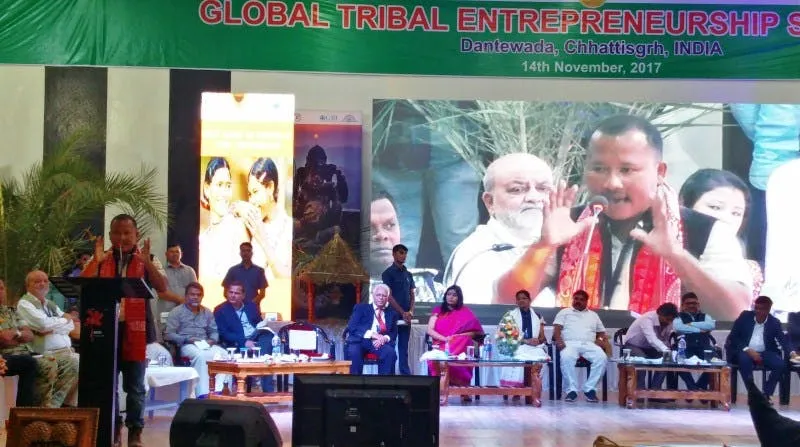
The summit highlighted India’s enabling environment for innovation and entrepreneurship – including actions taken by the government to empower tribals, increase the ease of doing business, eliminate regulations and support startups.
The Guest of Honour, Dr. M.S. Swaminathan, spoke on how tribal entrepreneurship is an important component of human entrepreneurship and how tribal women contribute extensively in conserving India’s biodiversity.
He said, “It is high time we respect tribal wisdom and bring tribals into mainstream development. Their invaluable knowledge will help us with innovative ideas to improve our livelihood and environment security.”
Celebrating the tribal ways of life and the rise of entrepreneurship in tribal India, we present a list of tribal entrepreneurs and enterprises, who are using indigenous ways to build social enterprises in India. The list, by no way is exhaustive, but represents the trends and innovations at large.
1. Tenzing Bodosa: building world’s first elephant-friendly tea farms
Started by Tenzing Bodosa, a rural entrepreneur from Assam, Bodosa Farms exhibit lush green tea estates in Kachibari village in the state's Udalguri district. Once can spot hornbills, wild pigs, deer, and peacocks in these farms. Not just that. Bodosa Farms take pride in being the only elephant friendly tea-farms in the world, as more that 70 elephants visit them. There are dedicated areas in the farm where elephants can feed from bamboo trees.
With customers from across the world, Tenzing’s farms reaped revenues of Rs 60-70 lakh last year. He has also trained 30,000 farmers in the area. “With organic methods and working with ways of nature, any farmer will benefit. This is in our traditional wisdom,” Tenzing said at the Tribal Entrepreneurship Summit.
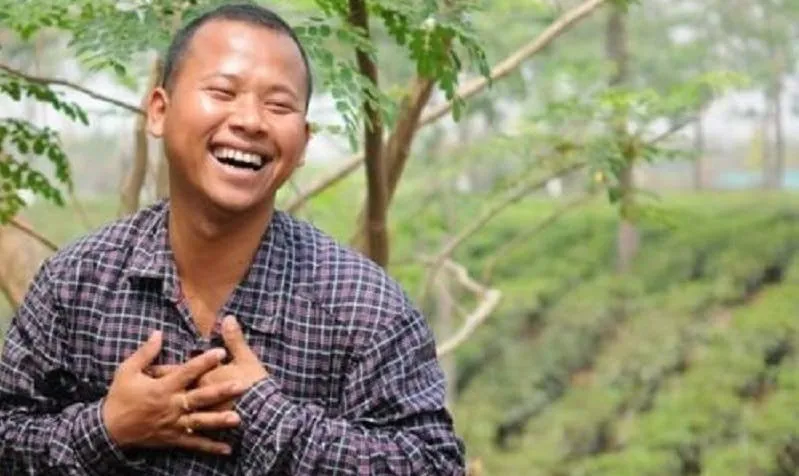
Source: Greenpeace
2. Mendha Lekha: India’s first bamboo economy village
The Forest Rights Act of 2006 gave forest inhabitants the right to manage, conserve, protect and regenerate the forests and its resources. The act gives ownership of minor forest produce, except timber, to dwellers living in the village territory. This produce includes bamboo, honey, lac, herbs, leaves, berries, fruits, among other things. It, however, took 6 years and a long legal battle before Mendha Lekha, a tribal village situated in Gadchiroli district, Maharashtra, could become the first village to be granted community forest rights.
Today the village has a successful bamboo economy. The entire village, comprising 450 people belonging mainly to the Gond tribe, works together in cultivating bamboo as raw material for the paper industry. The villagers make profits in crores, and are using the money for several development and social welfare activities in the area.
3. Women of Odisha: when ‘pattals’ trended in Europe
A group of over 3,500 women from 127 tribal hamlets in Kandhamal, Sambalpur, Angul, and Deogarh entered into a formal agreement with Leaf Democracy, a German company, to supply one lakh siali leaf plates every month. The plates, commonly known as pattals, are in high demand in European countries, and act as a biodegradable alternate to plastic and styrofoam.
These women, who earlier sold minor forest products such as siali leaves, sal seed, mohua flowers and tamarind locally, are today working as a women’s self-help group and inspiring many other women to follow suit.
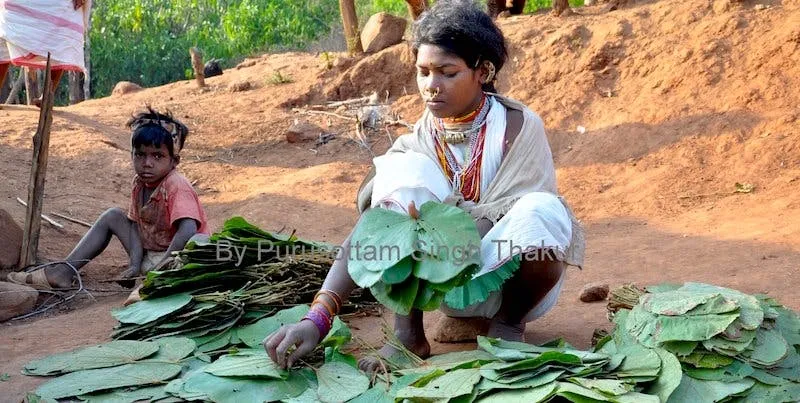
Image: KBK Reporter
4. Aranya: building a tamarind economy in tribal Chhattisgarh
Sukma is the southernmost district of Chhattisgarh. In 2016, the District Collector came up with Aranya, a social enterprise that is now changing the lives of tribals living here. The organisation produces Imli Chaska, a sauce made from tamarind, which grows in abundance in the region. Grown organically, the sauce contains 85 percent fruit pulp as compared to the industry standards of 27 percent.
5. EAGL: using goats to fight poverty in tribal Maharashtra
Dr Nilratan Shende extended his PhD research on poverty elimination and built a social enterprise out of it. The enterprise he started, EAGL, is empowering farmers and tribal groups in Maharashtra’s Melghat region using livestock.
Nestled in the dense forests along River Tapti, Melghat is home to many tribal villages, belonging mainly to the Korku community. EAGL supports these families with livestock, mainly goats, and has helped over 200 families break the shackles of poverty.
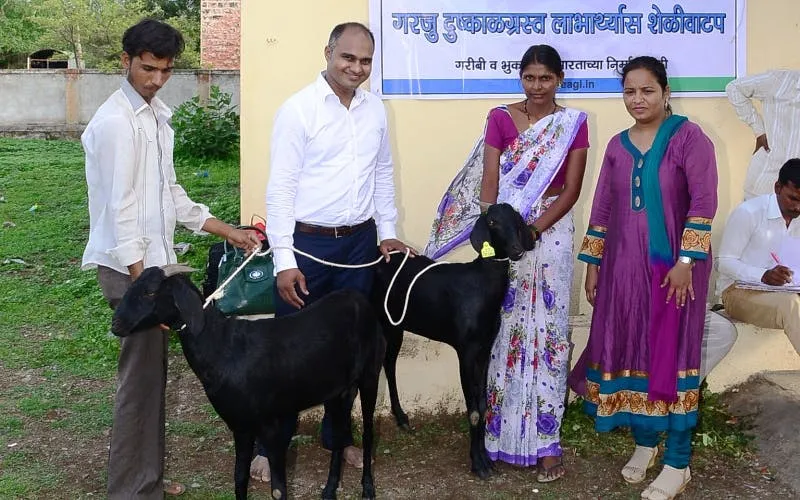
6. ALC India: empowering 65,000 women by turning them into entrepreneurs
The Hyderabad-based organisation has incubated 54 social enterprises across five Indian states, providing livelihood to over 65,000 women. These women belong to tribal groups, small and marginal farming communities, livestock holders, weavers, internally displaced, and other vulnerable communities.
Through training, skill development, market connects, and other support mechanisms, ALC India helps social enterprises become self-sustainable and profitable. From farmer producer companies to milk cooperatives, most of these enterprises are reaping crores in revenue today.
Read More – Story of Kodangal Farmer Producer Company, a Social Enterprise incubated by ALC India
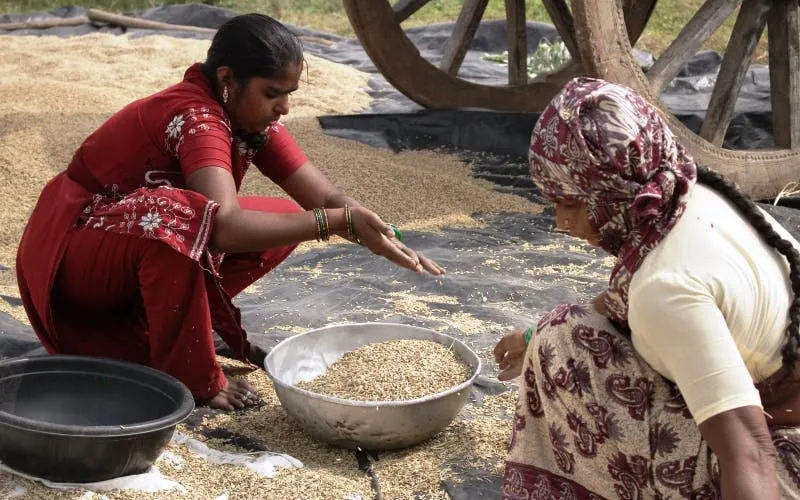
7. Last Forest: providing livelihood to 6,500 tribals in remote Nilgiris
The last Forest provides livelihoods and training in sustainable harvesting and organic agriculture to tribal groups living in the Kotagiri region of Tamil Nadu. Home to several tribal groups like the Todas, Kotas, Irullas, Kurumbas, Paniyas, Adiyans, Edanadan Chettis and Cholanaickens, Last Forest is providing livelihood to over 6,500 people.
Started as a marketing platform for indigenous communities, self-help groups, social enterprises, and Fair Trade entities, Last Forest today runs stores in Ooty, Coonor and Kotagiri, and supplies in wholesale to over a hundred stores across India. The brand sells beeswax products like lip balms, balms and handmade soaps along with non-timber forest products like gooseberry, pepper, soapnuts, black jamun and nutmeg.
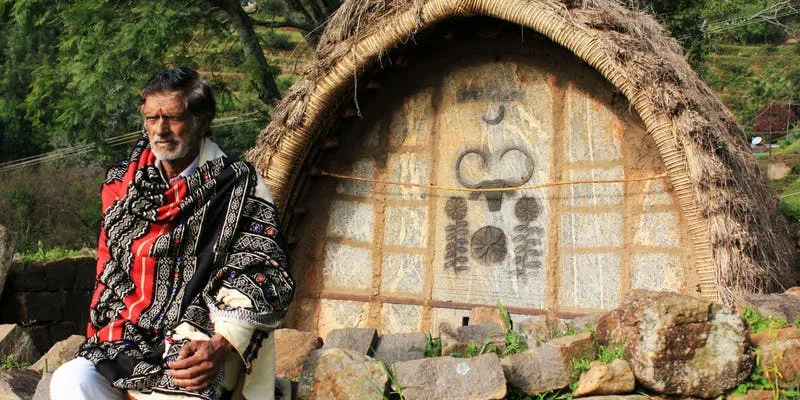
8. Gothrathalam: an alternate school for tribal children in Kerala
Situated in Chavady village, 20 km from Thiruvananthapuram, Gothrathalam is an alternative school for tribal children. The school was started by Mini Raman and her husband Sudhi Nammayan in 2012, and imparts alternative education not just in Malayalam and English, but also the native tribal language. Children here also learn dance and art, and are groomed and mentored to become curious individuals.







